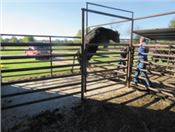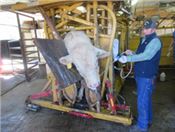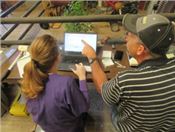Successful Bull Breeding Soundness Clinics Find Only Seven Percent Unsatisfactory

This bull wasn't very happy after his breeding soundness exam.
Photo credit: University of Missouri Extension
MT. VERNON, MO.
The series of bull breeding soundness clinics held during October found only seven percent of the 243 bulls checked to be unsatisfactory potential breeders.
Over the 23 previous clinics since 2005 the fail or defer rate has averaged between 10 and 15 percent out of 3,221 text bulls according to Eldon Cole, livestock specialist with University of Missouri Extension.
This year the veterinary clinics participating were in Cassville, Miler, Diamond, Aurora and El Dorado Springs.
University of Missouri Extension livestock specialists create awareness about the importance of having bulls checked at least annually uses these clinics. This practice determines the bull's readiness to breed females in a short, 45 to 75 day breeding season.
“A short breeding season results in a more uniform set of calves which improves their marketability and profitability,” said Cole.
The fall clinics saw bulls from 11 southwest Missouri counties with 63 owners. Two bulls came from one Kansas herd. Ninety-four (39 percent) of the bulls were Angus, 28 head were SimAngus and 25 were Gelbvieh. All together, there were 18 different breeds or composites.
The 243 bulls had an average age of 2.8 years with a range from 12 months to 10 years. Not all clinics have a scale but 182 bulls averaged 1541 lbs. The range for weights was from 855 to 2518 lbs.
The body condition scores varied from 4 to 7 with a 5.8 average. Scrotal size, in centimeters, averaged 38.7 with a range from 31 to 45. The percentage of normal sperm in the samples averaged 83.3 with a range from 22 to 96.
Bulls with lower than 70 percent normal are not eligible to be passed as satisfactory potential breeders but may be deferred for a re-check in three to six weeks.
In addition to the low percent normal sperm other reasons for bulls failing were penile problems and failure to collect a semen sample. Poor hoof structure, primarily on rear hooves were noted in 18 bulls.
The clinics are made possible with the assistance of Zoetis Pharmaceuticals who provided vaccines for the booster vaccinations and internal and external parasite treatments. ∆

Deworming the bulls is included in the breeding soundness clinics.
Photo credit: University of Missouri Extension

The veterinarian and his assistant check out a new program for data collection
and storage on bulls.